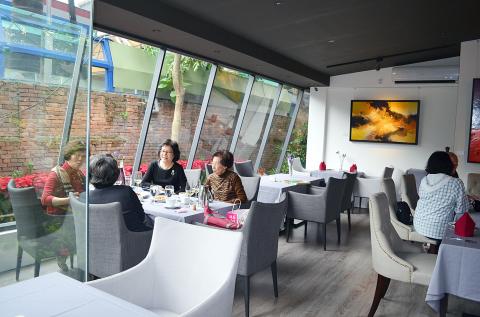In a city with a rich, diverse past like Taipei, serendipity comes in many ways. Tom Chen (陳登壽) owns Jimmy’s Kitchen, a famous Shanghai restaurant with its own history — one that included the original owner fleeing to Taiwan from Shanghai in 1949. But Chen always had another dream.
Chen began work in the service industry at the Grand Hotel, which sent him to Lubeck, Germany to learn bar tending. While there, he became fascinated with the vibrant, raucous atmosphere of salons — places where artists, writers and academics would meet and discuss art and other topics. Chen’s dream was to bring that experience back to Taiwan.
Enter Wolfgang Kroll (1906-1992), a Professor Emeritus in Physics at National Taiwan University (NTU) who grew up in Germany at the height of the Art Deco period. Kroll held the belief that art, literature and science should interrelate.

Photo: Jerome Keating
Kroll may not be a household name with most Taipei residents, but he is well known in the medical and science community because he helped draw international attention to the university, and was responsible for teaching theoretical physics as well as German to generations of physicists and future doctors even after his official retirement.
Kroll, who studied quantum mechanics in Germany under Nobel Prize-winning physicist Werner Heisenberg, emigrated from his home country after Hitler and the Nazi party came to power because one grandparent had Jewish ancestry. With a fascination for Japanese language and culture, Kroll went to Japan in 1937, and then, in 1941, its then-colony Taiwan. One of Kroll’s research papers became the first paper from Taiwan to be published in an international journal.
Until his death in 1992, Kroll lived for half a century in a small Japanese-style house belonging to the university. After his death, the building returned to NTU, which offered it up for development. Still nurturing the dream of a salon, Chen, along with his artist and interior designer-friend Tsai Wen-hsiung (蔡文雄), signed a seven-year lease with the university with an option for renewal. Six months later, the split-level, upscale salon with plenty of natural lighting and artwork, opened to the public as Jimmy’s Garden.
Not strictly a gallery, though art is everywhere, or a restaurant, though you can go there for a meal as well as teatime, Jimmy’s Garden tries to replicate the ambiance of a salon, where he hopes that a new generation of artists, academics and intellectuals will come together over a glass of wine or cup of coffee to discuss and debate current events.
Artists are encouraged to submit an application to display their work at Jimmy’s Garden. Yu Lien-chun’s (余連春) terracotta and metal sculptures are on display until Jan. 31. The salon is open daily from 11am to 9pm and closed on Mondays. 5, Ln 11, Xinsheng S Rd, Sec 3, Taipei City (台北市新生南路三段11巷5號); tel: (02) 2368-1197.

On April 26, The Lancet published a letter from two doctors at Taichung-based China Medical University Hospital (CMUH) warning that “Taiwan’s Health Care System is on the Brink of Collapse.” The authors said that “Years of policy inaction and mismanagement of resources have led to the National Health Insurance system operating under unsustainable conditions.” The pushback was immediate. Errors in the paper were quickly identified and publicized, to discredit the authors (the hospital apologized). CNA reported that CMUH said the letter described Taiwan in 2021 as having 62 nurses per 10,000 people, when the correct number was 78 nurses per 10,000

As we live longer, our risk of cognitive impairment is increasing. How can we delay the onset of symptoms? Do we have to give up every indulgence or can small changes make a difference? We asked neurologists for tips on how to keep our brains healthy for life. TAKE CARE OF YOUR HEALTH “All of the sensible things that apply to bodily health apply to brain health,” says Suzanne O’Sullivan, a consultant in neurology at the National Hospital for Neurology and Neurosurgery in London, and the author of The Age of Diagnosis. “When you’re 20, you can get away with absolute

May 5 to May 11 What started out as friction between Taiwanese students at Taichung First High School and a Japanese head cook escalated dramatically over the first two weeks of May 1927. It began on April 30 when the cook’s wife knew that lotus starch used in that night’s dinner had rat feces in it, but failed to inform staff until the meal was already prepared. The students believed that her silence was intentional, and filed a complaint. The school’s Japanese administrators sided with the cook’s family, dismissing the students as troublemakers and clamping down on their freedoms — with

As Donald Trump’s executive order in March led to the shuttering of Voice of America (VOA) — the global broadcaster whose roots date back to the fight against Nazi propaganda — he quickly attracted support from figures not used to aligning themselves with any US administration. Trump had ordered the US Agency for Global Media, the federal agency that funds VOA and other groups promoting independent journalism overseas, to be “eliminated to the maximum extent consistent with applicable law.” The decision suddenly halted programming in 49 languages to more than 425 million people. In Moscow, Margarita Simonyan, the hardline editor-in-chief of the